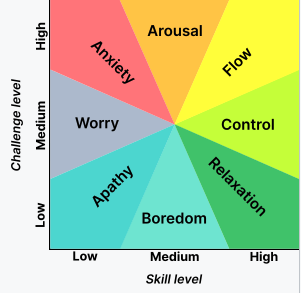That One Flow Hack
Maybe you’re familiar with Csíkszentmihályi’s “Flow” concept. In a nutshell, it describes a state “in which a person performing some activity is fully immersed in a feeling of energized focus, full involvement, and enjoyment in the process of the activity”.
Here’s a chart describing mental states relating to skill level and challenge level, showing Flow in the top right corner of high skill / high challenge:

But today, I don’t want to go into the idea of Flow. I want to show you something else this chart is good for.
When starting to work on something (from task to project, this works for everything), consult the flow map and see if you can spot your work somewhere on the matrix. After you’ve categorised it, you can decide how you want to manage it.
Sure, there’s more nuance to it. Everything that applies to task/project management in general also applies here - like how long will it take, who else is involved, etc. I’m not saying you should toss out everything else about work management.
But having a look at the flow chart might indicate how you feel towards a specific work item and in turn will allow you to fine-tune your response to it.
Maybe all you need to do is to set aside some time for it. Maybe you need to factor in lots of procrastinating. Maybe you need to map out a strategy on how to tackle it.
And there’s another angle to it. In Rest and Growth, I talk about how important it is to allow your body (of which your brain is a part of) to soak up the growth input of challenging times.
So, if you already tickled your brain with an exhausting, high-growth-potential task, why not pick something on the Relaxation/Control spectrum (or dare I suggest even “Boredom”?) to give your brain some much-needed rest?
If you can choose what to do next, pick something that follows your mood and your need for a push, or for rest.